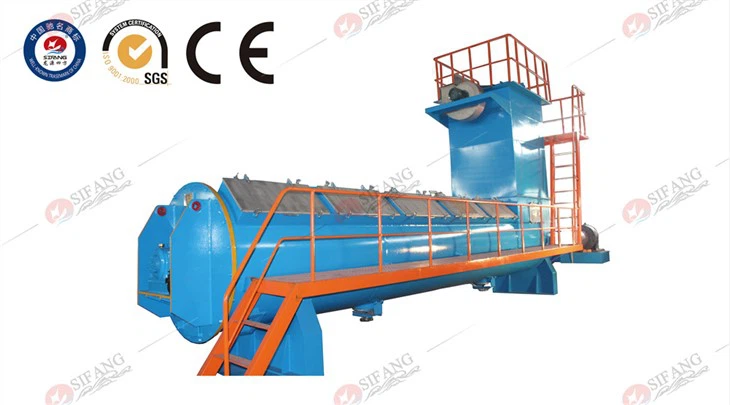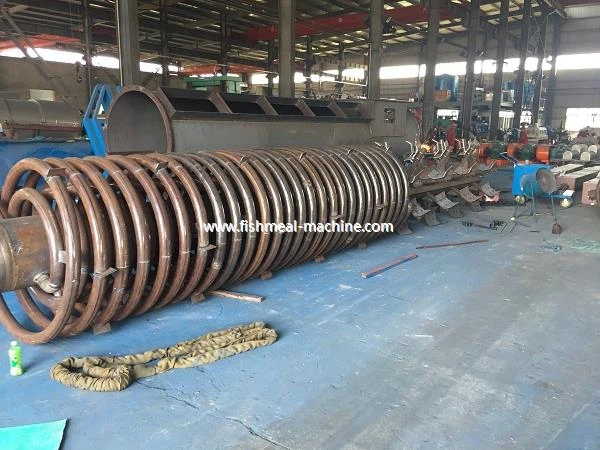Can a fish meal cooler be used for other types of meals? This is a question that has sparked much interest among food processing professionals, and as a supplier of Fish Meal Coolers, I'm excited to delve into this topic to provide some insights.
Understanding Fish Meal Coolers
Before we explore the potential use of fish meal coolers for other types of meals, let's first understand what a fish meal cooler is and how it works. Our company offers a range of fish meal coolers, including the Fish Meal Cooler with Water Cooling, Fish Meal Cooler, and Fish Meal Cooler with Air Cooling.
Fish meal coolers are designed to quickly and efficiently cool down fish meal after it has been cooked or processed. The cooling process is crucial as it helps to preserve the nutritional value of the fish meal, prevent spoilage, and ensure a longer shelf - life. The water - cooled models use water as a cooling medium, which is circulated around the cooling chamber to absorb heat from the fish meal. Air - cooled models, on the other hand, use fans to blow air over the meal, carrying away the heat.
Factors to Consider for Using Fish Meal Coolers with Other Meals
When considering using a fish meal cooler for other types of meals, several factors need to be taken into account.
Physical Properties of the Meal
The physical properties of the meal, such as its density, particle size, and moisture content, play a significant role. Fish meal typically has a relatively fine particle size and a certain moisture content. Other meals, like grain - based meals or meat - based meals, may have different particle sizes and densities. For example, a coarse - grained meal may not flow through the cooler as smoothly as fish meal, which could lead to uneven cooling. Moisture content is also important. Meals with high moisture content may require a different cooling approach to prevent mold growth during the cooling process.
Chemical Composition
The chemical composition of the meal is another crucial factor. Fish meal contains specific proteins, fats, and other nutrients. Different types of meals may have different chemical compositions, which can affect their reaction to the cooling process. For instance, some meals may be more prone to oxidation during cooling, which could lead to a loss of flavor and nutritional value.
Contamination Risks
Using a fish meal cooler for other types of meals may pose contamination risks. If the cooler is not properly cleaned between different types of meals, there could be cross - contamination. For example, if a fish meal cooler is used to cool a vegetable - based meal without proper cleaning, the vegetable meal may be contaminated with fish residues, which could be a problem for consumers with fish allergies or for those who prefer a strictly vegetarian diet.
Potential Applications of Fish Meal Coolers for Other Meals
Grain - Based Meals
Grain - based meals, such as cornmeal or wheatmeal, can potentially be cooled using a fish meal cooler. These meals are often produced in large quantities and require efficient cooling to prevent spoilage. The cooling mechanism of a fish meal cooler can be adjusted to accommodate the physical properties of grain - based meals. For example, the air - flow rate in an air - cooled fish meal cooler can be increased to ensure proper cooling of the coarser grain particles. However, it is essential to ensure that the cooler is thoroughly cleaned before and after use to avoid any cross - contamination.
Meat - Based Meals
Meat - based meals, like ground beef or chicken meal, can also benefit from the cooling capabilities of a fish meal cooler. After the meat is cooked and processed, it needs to be cooled quickly to prevent the growth of bacteria. The water - cooled fish meal coolers can be particularly effective in rapidly reducing the temperature of meat - based meals. Similar to grain - based meals, proper cleaning of the cooler is necessary to prevent cross - contamination between different types of meat and fish.
Vegetable - Based Meals
Vegetable - based meals, such as pureed vegetables or vegetable powders, can potentially use fish meal coolers. Vegetable meals often need to be cooled to maintain their color, flavor, and nutritional value. The cooling process can help to stop the enzymatic reactions that occur after processing. However, as mentioned earlier, strict cleaning procedures must be followed to avoid fish contamination.
Case Studies
Case 1: Grain - Based Meal Cooling
A food processing company that primarily produced fish meal decided to diversify its product line and start producing cornmeal. They decided to use their existing fish meal cooler to cool the cornmeal. After some adjustments to the air - flow rate and a thorough cleaning of the cooler, they were able to achieve satisfactory cooling results. The cornmeal was cooled evenly, and the quality was maintained. This case shows that with proper adjustments and cleaning, a fish meal cooler can be used for grain - based meals.
Case 2: Meat - Based Meal Cooling
Another company that produced both fish meal and chicken meal used their fish meal cooler for chicken meal cooling. They found that the water - cooled fish meal cooler was very effective in quickly reducing the temperature of the chicken meal. By implementing a strict cleaning protocol, they were able to prevent cross - contamination between the fish and chicken meals.
Conclusion
In conclusion, a fish meal cooler can potentially be used for other types of meals, including grain - based, meat - based, and vegetable - based meals. However, it is essential to carefully consider the physical properties, chemical composition, and contamination risks of the different meals. With proper adjustments to the cooling process and strict cleaning procedures, fish meal coolers can offer an efficient and cost - effective solution for cooling various types of meals.


If you are interested in exploring the use of our Fish Meal Coolers for your specific meal - cooling needs, we invite you to contact us for a detailed discussion. Our team of experts can provide you with more information, offer customized solutions, and assist you in making the best decision for your food processing operations.
References
- "Food Processing Technology: Principles and Practice" by P. J. Fellows
- "Handbook of Food Preservation" edited by M. S. Rahman
